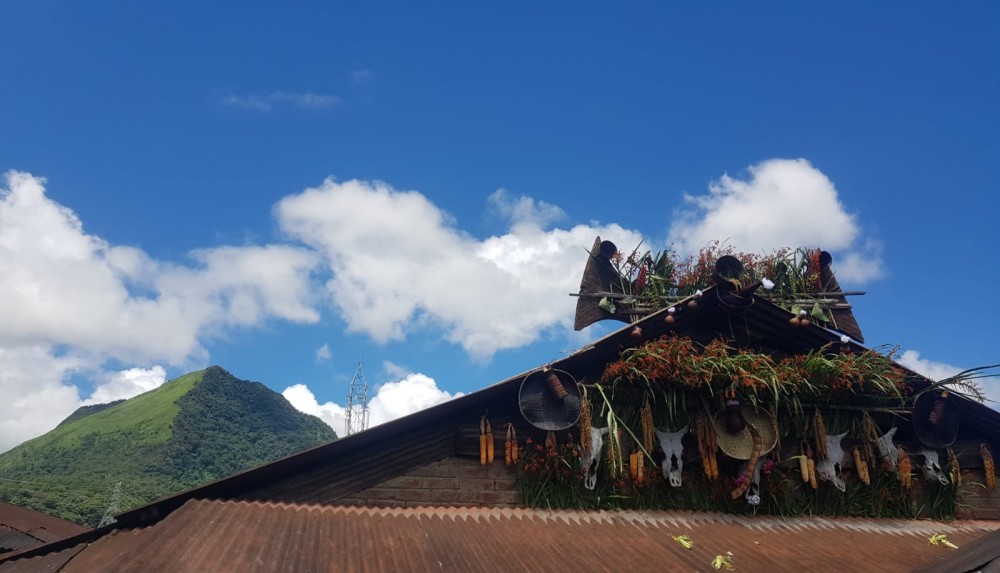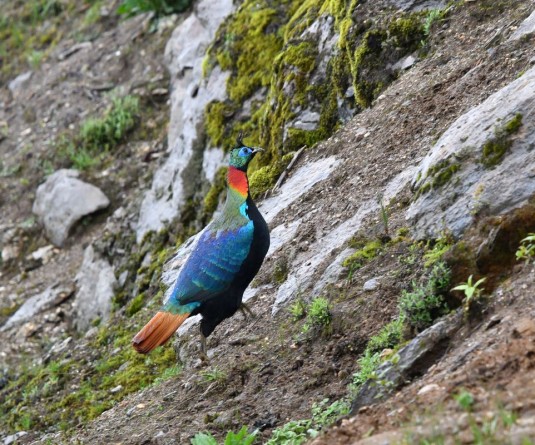The iconic Teyozwu mountain, Viswema with a typical Naga house decorated during Te-L khukhu.

Rusovil John, Former IFS
Viswema: Nagaland
Long long ago in the days of yore, when there were no motorable roads, no electricity, no kerosene lamps, no school, no health care facilities with hunger pervading, a time when the cattle, pigs, poultry, dogs and cats all share the same roof, life at Viswema village was tough. The mountainous terrain which they had chosen to settle posed many challenges and slash and burn agricultural practice which was practiced did not satisfy them and as they had the knowledge of terracing the mountain slopes for permanent agriculture and aligning agricultural irrigation canals to bring water from the higher elevated water sources during the south-west monsoon season as practiced in the Yunnan province of China and by the Igorot tribes of the Philippines the Viswemi people also terraced their wet paddy fields and canals for settled agriculture. By cultivating rice, they became prosperous amidst the odds of nature, lack of modern tools, diseases, pestilence and above all the constant fear of war as in those days the infamous headhunting was prevalent.
In the wet rice terrace cultivation, the season begins with the onset of the south-west monsoon. The favorable season is announced or stirred by the visit of the migratory Cuckoo bird, which is called Koki in Viswemi Chokri language. The villagers know that when the Koki gives its call “Kooo-ki, Kooo-ki” from the Soteyophi forest in the foot of the Viswemi’s iconic pyramidal half grassland half forest Teyozwü mountain, it is time for preparation of paddy nursery and that rains are not far away. It is because of this invaluable role played by the Koki bird, it is taboo to kill it by the locals.
Those days, the girls keep their head shaven till marriage. In an agrarian society, there is always need for an extra hand to help in the endless work of tilling the land, collection of fuel wood, tending to cattle, poultry, piggery, fetching water, construction of houses, protecting the village, looking after the infirm and the children etc. The paddy cultivation season is by far the most taxing season because once transplanting is not done in time, the paddy will not yield good harvest. Usually by the summer solstice i.e. 21st June (which is the longest day in the northern hemisphere) the majority of the transplanting is over which enables the harvesting before the freak winter showers in October. Now, during this season, when the abled men and women till the land and undertake transplantation of paddy, the role of the little girls is either to help in the fields or stay at home with the other siblings and look after the household chores the whole day waiting for their parents to return after the hard days’ work. Their role is in no way an easy task. As the sun sets, she and her siblings awaits the return of their parents and as darkness falls, she carries her sibling on her back and out of fear of the dark and probable enemies she melancholically sings out a lullaby “Apo Aze vo ta te, ene n khwe ho-a te mo mo, A va meru-a te mo mo, vo ta te te” (Father, Mother come home, I’m eagerly waiting for you, I am hungry, come home”) while the chirping cicadas echoes the dusk into the dark night dotted by fireflies completing the eerie environment.
As the transplanting season is over and the harvest of the foxtail millet is done, on the 13th day of Chünyi in the lunar traditional calendar, a festival is celebrated exclusively for the girls acknowledging their services to the family and society called Te-L khukhu. Te-L khukhu festival of Viswema perhaps may be one of the only festivals which is exclusively for the girl child. The festival is not performed in large crowds or mass gathering ceremonies or in social functions traditionally but in a very special way where the family, neighbors and peer groups participate. The girl peer groups collects flowers of many colors, make dolls of maize cobs and decorate the loft called “Chokrü” at the entrance of a typical Naga house where they sit, lunch and have a frolicking time together.
Prior to the day, hunting, fishing, snailing activities takes place. The parents goes to the forest and collects wood borer larvae from Oak trees (Quercus griffithii) collects fresh water snails, crabs and other assorted insects which forms part of the many Naga food delicacies. The food for the occasion is prepared and packed in a leaf of Ficus species (Khabu-nu) rolled to a conical shape held by a bamboo pin. Traditionally, the packed lunch may consist of two or more items such as meat, egg, wood borer larvae, fresh water snails and crab. Rice and the special dishes prepared are then packed and delivered by the girl to her friends and neighbors who in turn give a return gift. This exchange of lunch packs on this day by the girls is called Khukhu, hence the festival name Te-L khukhu. Sharing of the food and enjoying each other’s company in their new attires, with no male intervention makes their day special. It is an unconventional festival of basically gifting or exchanging nutritious food where one has to take part to enjoy it because strictly speaking there are no formal functions of which we are used to in this modern age. It is a day where the girl child is made to feel special, cared, wanted and loved by the family and society.
How then, do this ancient cultural Te-L khukhu festival practiced by the viswemis even today minus the rituals, have relevance in today’s modern society? Well, a girl grows up to become a mother and we need to respect that as practiced by our ancestors. Therefore, on the occasion of Te-L khukhu festival; which falls on the 13th of Chünyi lunar calendar 2023; corresponding with 29th July 2023, let us be a part of this wonderful Naga culture called Te-L khukhu festival and wish the girl child a “Happy Te-L khukhu” and make her feel loved!




